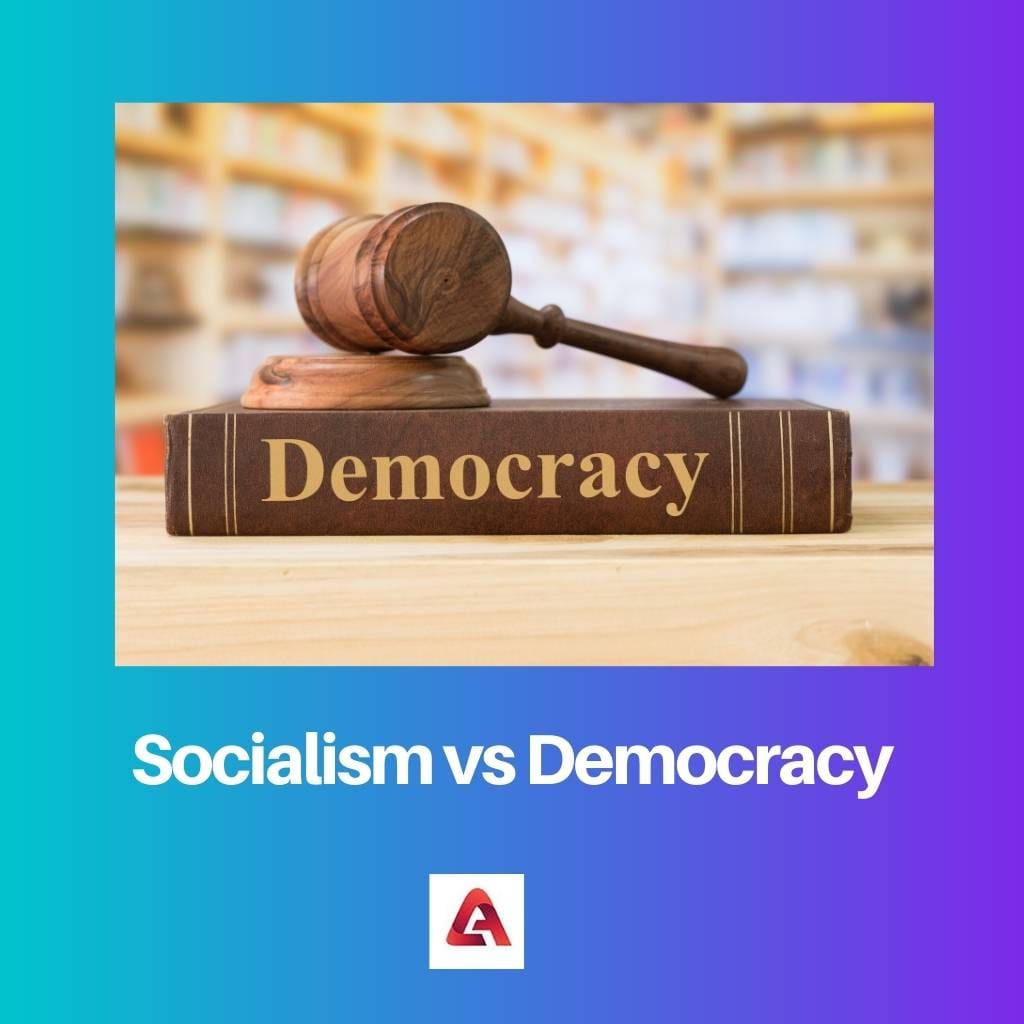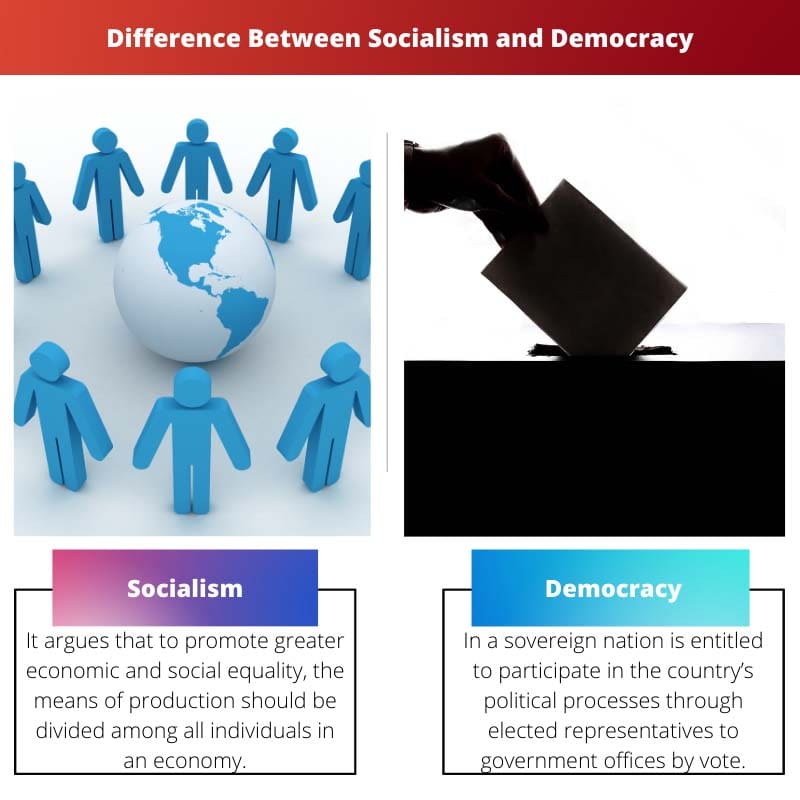According to the definition of socialism, it is “A concept of social organization for which private income and property distribution are subject to the control of the masses”
According to the definition, Democracy is a form of governance in which the entire nation or all qualified citizens of a state are represented by elected members.
Key Takeaways
- Socialism emphasizes collective ownership and control of the means of production, while democracy focuses on political representation and protecting individual rights.
- Socialism seeks to eliminate economic inequality through wealth redistribution, while democracy prioritizes political equality through voting and participation.
- Both systems can coexist, as seen in democratic socialist countries that combine socialist economic policies with democratic political systems.
Socialism vs Democracy
The difference between Socialism and Democracy is that Democracy seems to be a political ideology, but socialism is just an economic model. Socialism is an economic system, and democracy is a political philosophy, the two cannot be compared. In a society, economic systems such as socialism and political philosophies such as democracy can coexist.

According to some analysts, the optimum mix of socialism and democracy acknowledges and balanced individuals’ rights and freedoms on the one hand while encouraging social collaboration.
Socialism and democracy cannot be compared because they are two separate concepts.
Socialism is an economic system, whereas democracy is a political philosophy.
An economic system describes how society’s commodities and services are produced and distributed, whereas a political system describes the institutions that will make up a government and how the economy will function.
Despite this, the two processes share a similar denominator: they both strive toward societal goals.
Comparison Table
| Parameters of Comparison | Socialism | Democracy |
|---|---|---|
| Definition | It argues that to promote greater economic and social equality, the means of production should be divided among all individuals in an economy. | It asserts that virtually everyone, if not everyone, in a sovereign nation is entitled to participate in the country’s political processes through elected representatives to government offices by popular vote. |
| Concept | It’s purely an economic concept | It’s purely a political science or politics. |
| Categories | It is related to certain other systems that define rights of ownership, such as capitalism (which emphasizes private property), communism (which emphasizes not just owning but also actively controlling most or all capital), and feudalism (nobility ownership of assets and people.) | It falls into the same category as other methods of selecting leaders and policies, such as dictatorship, monarchy, and oligarchy. |
| Structure | In socialism, the economic gains are shared throughout all sectors of society | Policy and the procedure can the done by the people or citizens by the way of giving votes |
| Method | Socialism is a strategy for managing the production and consumption of goods and services. | Democracy is a system of exercising political influence under the authority of the people. |
What Is Socialism?
Socialism is an economic model that emphasizes communal ownership of production processes and depends mostly on the state and the workers’ council to act as the society’s spokesperson for how these resources are handled and regulated.
Therefore, depending on the kind of socialism embraced by society, equality among members of society is harmed to various degrees.
People do not have the same right to be represented or the same right to take office under the extreme form of socialism, which has little or no concern for civil freedoms.
Socialism arose in response to liberal individualism and capitalism’s excesses and abuses. Under socialism, public ownership might take the form of technocratic, oligarchic, totalitarian, democratic, or even voluntary governance.
Socialism is frequently referred to be a utopian or “post-scarcity” system because of its practical difficulties and poor track record, however, current proponents think it might work if implemented properly.

What Is Democracy?
Democracy, on either side, is a political system that supports an individual’s right to self-development and independence. In a democratic country, people either rule themselves directly (direct democracy) or elected officials to whom the authority to govern is assigned.
However, in some democratic processes, a segment of society, particularly the poor, is unable to participate effectively in political activities due to the influence of interest groups with the financial means to economically exploit others
by using their economic power to control and even corrupt the political system.
Democracy originated from the Greek words “demos” (people) and “Kratos” (power); hence, democracy may be defined as “power of the people”: a form of government based on the will of people.
Since there are so many various types of democratic governance across the world, it can sometimes be simpler to grasp the concept of democracy by considering what it isn’t.
Therefore, democracy isn’t an autocrat or dictatorship, in which one person governs; nor is it an oligarchy, in which a small group of people rules. If democracy is properly defined, it should not even be “rule of the majority” if it implies that the minority’s concerns are entirely neglected.
At the very least, a democracy

Main Differences Between Socialism and Democracy
- Democracy is a process for making broad decisions for a country, society, or organization. But Socialism is an economic framework for determining production decisions.
- In socialism, in the majority of economies, manufacturing choices are decided privately for profit in a market setting. But in a democracy, it is for the public.
- Socialism is an economic concept, but democracy is a political science.
- Democracy is a method of exercising power and influence under the authority of the people. Socialism is a strategy for managing the manufacture and distribution of goods and services.
- Socialism is run by the people for making a profit but democracy is un for the welfare of the people

- https://books.google.com/books?hl=en&lr=&id=VbFTAQAAQBAJ&oi=fnd&pg=PP1&dq=Difference+Between+Socialism+and+Democracy&ots=34zBbAsZ94&sig=esnXcxsJmLs4vEsFujMySZvoO1E
- https://www.ceeol.com/content-files/document-226649.pdf
Last Updated : 26 July, 2023


Emma Smith holds an MA degree in English from Irvine Valley College. She has been a Journalist since 2002, writing articles on the English language, Sports, and Law. Read more about me on her bio page.

The insights offered by the article on distinguishing socialism as an economic model and democracy as a political philosophy are enlightening. It provides clarity on the coexistence of these systems within a society.
I share your view, Pgray. The article adeptly illustrates the distinct domains of socialism and democracy, highlighting the balance between economic and political elements.
Strongly agree, Pgray. The knowledge provided in the article encourages a more profound understanding of the intricate relationship between socialism and democracy.
The description of socialism and democracy is comprehensive and well-articulated. It emphasizes the crucial aspects of each system and how they contribute to the overall framework of society.
Well-stated, Jones. The article effectively conveys the fundamental principles of socialism and democracy, making it informative for readers seeking in-depth knowledge.
A very informative and well-written article. It is essential to understand the difference between socialism and democracy. Both systems have different underlying principles and goals and can coexist in a society.
Great comment, Karen. It is indeed crucial to recognize the distinctive features of economic and political systems in society.
I agree with your perspective. A clear understanding of the concepts of socialism and democracy is fundamental for everyone.
The article’s explanation of socialism and democracy offers a comprehensive analysis of both systems, demonstrating the complexity of their interaction and coexistence within a societal framework.
Absolutely, Richards. The article effectively dissects the intersection of socialism and democracy, elucidating the synergy between these divergent systems.
The comparison table provided in the article effectively highlights the key differences between socialism and democracy. It is an insightful analysis that adds value to the understanding of these concepts.
Absolutely agree, Shall. The table presents a clear and structured comparison, making it easier for readers to comprehend the variations between socialism and democracy.
The article offers a compelling and comprehensive rundown of socialism and democracy, providing deep insights into the conflicting nuances and fundamental characteristics of these essential concepts.
The comparison between socialism and democracy forms a pivotal component of the article, elucidating the multifaceted nature of these systems. It serves as a scholarly resource for readers seeking in-depth comprehension.
Absolutely, Cook. The depth and scholarly tone of the article contribute to a nuanced exploration of socialism and democracy, engaging readers in substantive learning.
I concur with your assessment, Cook. The article’s descriptive approach to analyzing socialism and democracy enriches the intellectual discourse on these subjects.
The thorough examination of socialism and democracy in the article is enlightening. It provides readers with an insightful portrayal of the distinctive aspects inherent in each system.
Well said, Candice. The article offers a compelling discourse on socialism and democracy, fostering an enhanced understanding of these critical societal elements.
The detailed exposition on socialism’s economic model and democracy’s political philosophy underscores the intricate dynamics embedded within the societal framework, offering a compelling perspective for readers.
The detailed comparison of socialism and democracy in the article is highly educational. It serves as an informative resource for individuals looking to understand the fundamental disparities between these systems.
I couldn’t agree more, Davies. The article’s emphasis on the informative analysis of socialism and democracy reflects the substantial depth of the content.